By Claudia Pollak, Esq., Updated October 19, 2020
It’s never a fun experience to be laid off from a job, but it turns from a negative experience into a nightmare when you’re pregnant. The last thing you need when you’re starting a family – or growing one – is financial uncertainty.
Receiving a Severance Agreement
A severance agreement is a contract an employer can give to anyone they fire, lay off, or otherwise remove from a working position with the company. The employer is not required to offer such an agreement, nor is the worker required to sign it.
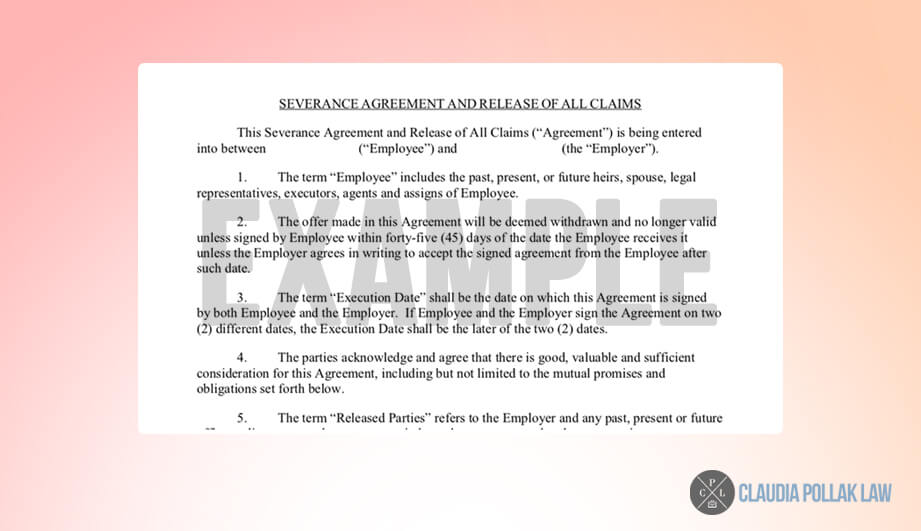
Usually, a severance agreement offers some level of monetary payment along the lines of some number of weeks of continued salary and either continued health insurance benefits or COBRA to cover some of the time after being fired. There may also be a variety of additional clauses, ranging from non-competes to particular ways stock options and investments are handled.
The usual purpose of a severance agreement is to prevent you from suing the company in exchange for ongoing benefits and some support while you look for a new job or transition into a new role in your life.
That said, some companies have been known to include unscrupulous clauses into their severance agreements. For example:
- One-sided agreements; you can’t sue them, but they can sue you.
- Revoking stock rights or options, preventing you from cashing out money or stock you’re owed.
- Including a non-compete that would make it dramatically difficult to find another job in your field.
Often, a severance agreement will be presented with an atmosphere of urgency; you need to sign it or you lose it. This might be true! There is no federal law requiring that an employer offer you a severance package, or keep an offer on the table once it is made. The exception is when your employment contract – the thing you signed when you were hired – entitles you to severance. You may also be entitled to a specific amount of time to consider a severance package, based on the Older Workers Benefit Protection Act.
Seeking Council as a Precaution
If you’re pregnant and you’re being laid off and offered a severance package, you want to consult with an employment attorney. It’s entirely possible that you’re being let go for reasons unrelated to your pregnancy, and that the whole situation is an unfortunate coincidence. However, it’s also possible that you could have grounds for a wrongful termination or discrimination suit, and signing a severance agreement would remove your ability to sue.

Additionally, an employment attorney will be able to look over a severance agreement for you and help you determine if it’s adequate or if there are clauses worth worrying about. These documents are often written in “legalese”, making it difficult to understand if you’re not used to reading contracts. You don’t want to sign away your benefits or rights in exchange for sub-par medical coverage and less severance than you’re actually entitled to.
If your council determines that your severance agreement is insufficient or discriminatory, or that the situation of your layoff is sketchy enough there may be grounds for a lawsuit, you should consider not signing it and pursuing other options. You can:
- Present a counter-offer; a severance package with more appropriate benefits and negative clauses removed.
- Threaten legal action for a wrongful termination suit, either to better your bargaining position or to retain your job.
- Refuse to sign an agreement and move forward with a lawsuit.
It’s worth mentioning that any time you use the threat of legal action to retain a job you were otherwise going to lose, you become a liability to the company, and they will be on the lookout for a more clear-cut reason to fire you where you won’t have cause to sue. It’s not a great option.
Are There Laws About Being Fired While Pregnant?
According to Executive Law section 296, sex and gender are protected classes in the state of New York.
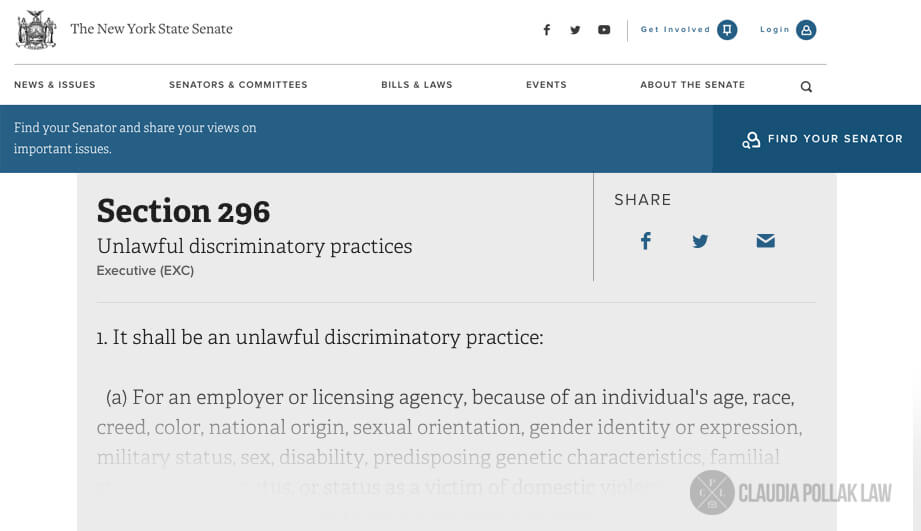
You cannot be fired for being female, either biologically or as your expressed gender identity. Because of this, appeals courts have consistently ruled that being pregnant is protected under Executive Law 296, in cases such as Elaine v. Joint Diseases North General Hospital.
Passed in 1978, the Pregnancy Discrimination Act of 1978 is an amendment to Title VII of the Civil Rights Act of 1964.
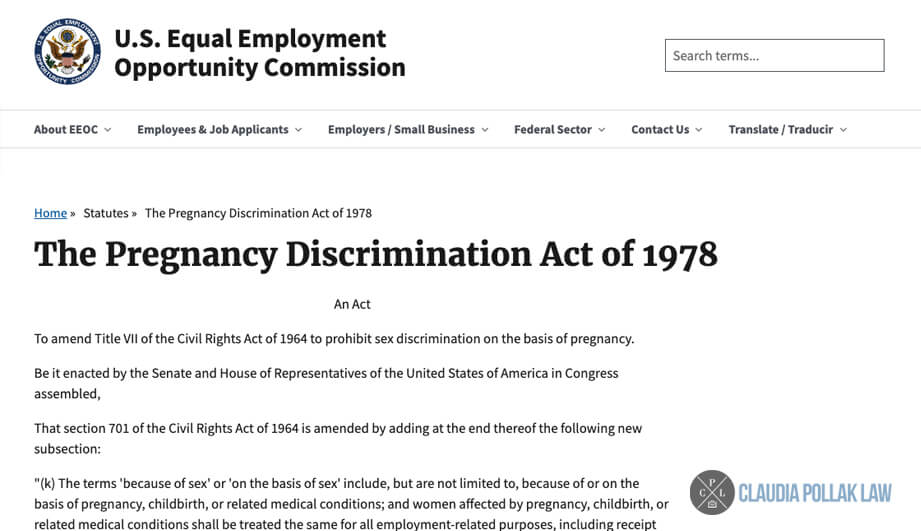
This amendment, among other things, specifies that pregnancy, childbirth, and related medical conditions are a part of sex and sex-based discrimination. This, along with the precedent set in cases such as Elaine linked above, set a foundation for the protection of pregnancy as a class.
Were You Fired Because You’re Pregnant?
One thing you will want to think about before considering legal action is whether you were fired while pregnant, or fired because you’re pregnant. There’s a tangible difference here, and it will make or break a lawsuit.
You cannot be fired because you are pregnant. However, if you happen to be pregnant and are under-performing in your job in an unrelated way, or your job is being removed for other reasons (like company downsizing, mass layoffs, or other nonspecific causes), you aren’t being wrongfully terminated. Someone who is caught stealing money from a company can be fired even though they’re pregnant, as the pregnancy has nothing to do with the termination. Of course, there are also plenty of instances and studies of companies finding excuses to fire pregnant employees.
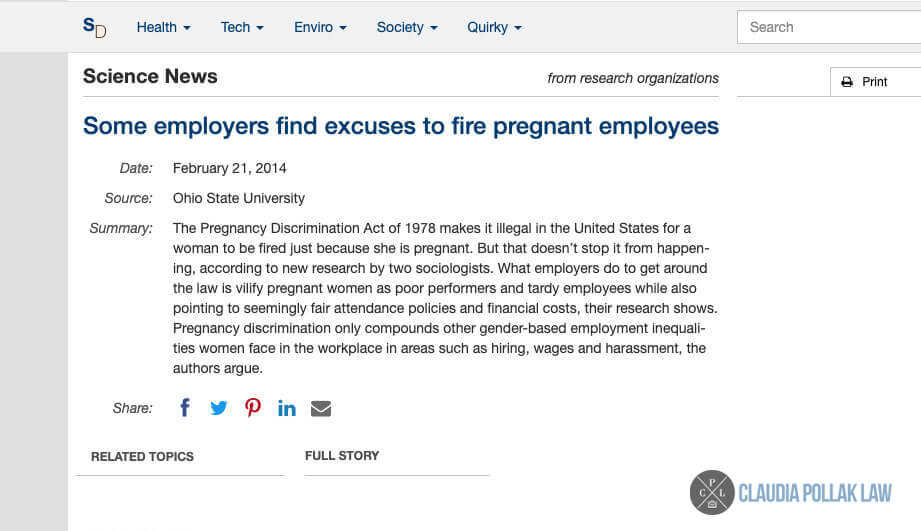
Thus, one of the most important considerations (if you’re being laid off while pregnant) is considering the situation. Did you announce your pregnancy and suddenly receive a severance agreement out of the blue, with no other incentive or cause? Or are there other factors at play, such as company budget cuts, performance issues, or other factors?
Looking Into Coworker Situations
One detail that can make or break a case is the treatment of other workers by your company. Does the company have a history of firing women when they announce that they’re pregnant, or once the physical signs of pregnancy become undeniable?

This can be a difficult detail to analyze with smaller companies or companies without much history to look at. If you’re the first among your coworkers to become pregnant while working for the company, that alone may raise some suspicion but isn’t necessarily enough cause on its own.
If other women working for your company have become pregnant, gone through pregnancy and birth, been granted maternity leave, and have come back to work without issues, your termination is less likely to be due to pregnancy itself. It’s not impossible; your boss might be different from their boss, for example. The specific situation needs to be analyzed.
On the other hand, if every time a woman becomes pregnant, she is terminated, with or without other cause, it sets a trend. It could still be coincidental, but there may be enough evidence to suggest some form of discrimination in the workplace.
Did You Announce Your Pregnancy?
Another factor you might want to look at when considering your severance situation is the proximity of your termination to your pregnancy announcement.
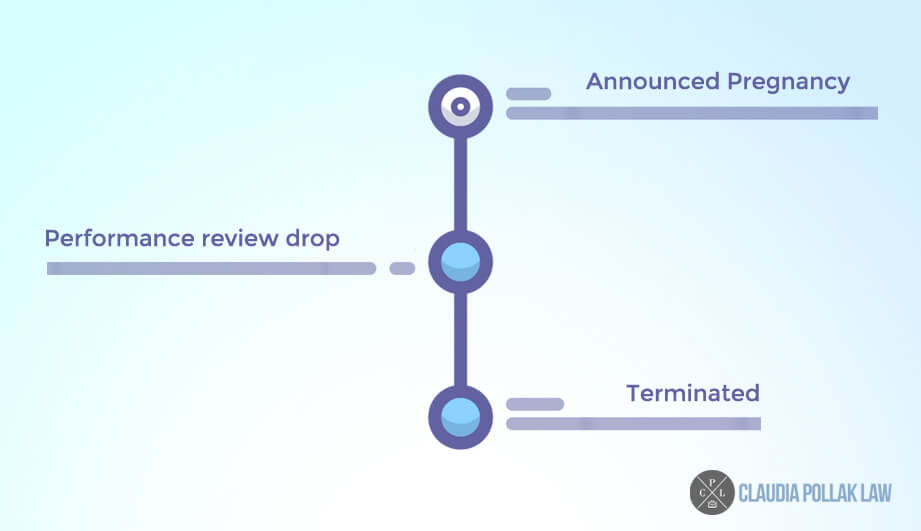
If you have not yet announced your pregnancy, well, you won’t be able to use it as leverage for a wrongful termination suit. It’s very faintly possible that, if your pregnancy is far enough along, your employer could make an educated guess based on physical signs and time-off requests. On the other hand, it’s more likely that it’s an unfortunate coincidence and that they didn’t know.
If you announced your pregnancy recently, consider reactions. Were your coworkers and supervisors generally happy for you? Have your bosses been supportive and flexible with time off requests for prenatal appointments or bouts of morning sickness? Or has there been back-handed comments, teasing, and subtle disparagement about the situation? A coworker joking about having to pull double duty while you’re gone is one thing, but a boss complaining about “all the women getting extra time off to pop out a kid” is quite another.
If you announced your pregnancy some time ago, it’s certainly possible that a recent layoff could be related. Companies might try to wait to get as much productivity out of you as they can before you give birth and go on maternity leave, and then fire you to avoid having to support you during that leave and beyond.
By waiting for a while after your announcement, they may think that they give themselves plausible deniability, and they may be spending the weeks and months after your announcement looking for a cause to terminate you. Pay attention to things like performance reviews; did they drop after your announcement despite there being no change to your productivity or job efficacy? That can be a warning sign.
What Do You Do Next?
It usually comes as a shock to be terminated while pregnant, and employers often count on this shock to pressure the terminated employee into signing a disadvantageous severance agreement under time pressure.
The first thing to know is that you are not legally required to sign the agreement when it is presented. You should be able to take a copy of the agreement and bring it to a lawyer for a consultation. Thus, the first thing you should do is find a local employment lawyer and bring the agreement to them to look over.
At this time, you can start looking for signs that your termination may have been triggered by your pregnancy or the announcement thereof. Look back to other pregnant coworkers and workers who have been terminated under similar circumstances, and look for a pattern. Look for signs that it was your announcement, and not your conduct, that led to this termination.
It’s important, to be honest with yourself and your attorney in this situation. While a lawyer you hire will fight on your behalf, if you lose a discrimination or wrongful termination suit, you’re going to be out of a job, out of severance, and saddled with legal fees, which will make your impending motherhood all the more difficult.
That’s not to say that you shouldn’t consult a lawyer if your termination is justified and unrelated to pregnancy. You may still be able to negotiate the terms of your severance agreement, to get more money or more health coverage out of your company, or to remove negative clauses from the agreement. Again, some companies use their severance agreements to strip workers of stock options and benefits they’re otherwise entitled to, and without a lawyer looking over the agreement, you might never know.
During this time, it can be possible for your employer to withdraw their severance offer. If you’re over 40 years old, the Older Workers Benefit Protection Act requires that the company allow you 21 days to consider whether or not to accept the agreement. However, if the circumstances change – such as if new evidence of your misconduct in the workplace comes to light – the change in circumstance can override the benefit protection clause.
For example, the Eighth Circuit Court of Appeals, in the 1999 case Ellison v. Premier Salons. The company fired its CFO and offered him severance. Later, before he had signed an agreement, the company discovered the CFO had made defamatory statements about the company, so the company revoked the initial severance offer and made a new, less valuable offer. The CFO signed the original offer, but the company refused to honor it. The courts determined that the OWBPA protections do not protect against a circumstance where the terminated employee’s situation changes in such a way.
Should you sign the severance agreement? That determination is up to you and your attorney. If the terms are adequate and you’re not signing away benefits you’re entitled to, signing it is fine. If you think you’re being terminated because of your pregnancy, you can use that as leverage to negotiate a better severance, or you can refuse severance and take the matter to the courts to fight for a judgment. In either case, you should consult with an attorney to determine which is best for your specific situation.




